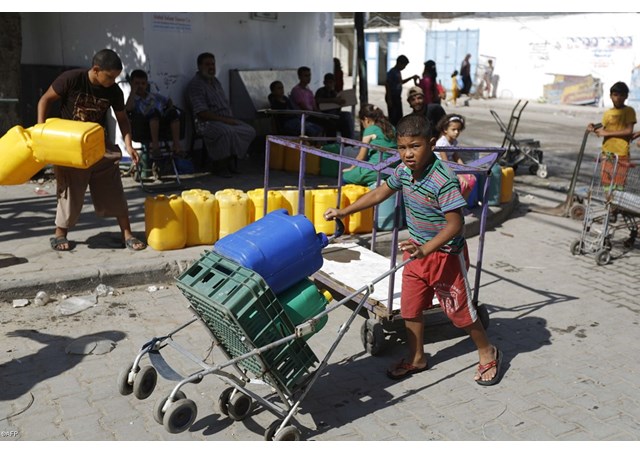
Gaza conditions “dire and unstable” with risk of renewed violence

(Vatican Radio) Though some two weeks have passed since the cessation of active hostilities between Israel and Hamas, the situation in Gaza is “quite dire and quite unstable.” That’s according to the head of Catholic Relief Services in the Holy Land, Matthew McGarry who notes “Gaza has fallen out of the news certainly, but it’s not as if the situation has returned to even some semblance of normalcy.”
Listen to Tracey McClure’s extended interview with Matthew McGarry:
Gaza war “massively exacerbated” preexisting problems
McGarry says the level of destruction wrought by Israel's 50 day military campaign on Gaza "is just immense. There are entire neighborhoods that are just completely pulverized.”
The level of destruction is such that it is far too early to speak of a recovery phase, he affirms, saying CRS is continuing to provide relief to Gazans. “As of tomorrow, we will have distributed household survival kits including kitchen items, water storage equipment and hygiene items to 6,000 families. We will have covered an additional 8,000 with hygiene kits provided by USAID.”
Food and water are already being distributed and CRS is helping to scale up particularly the water distribution, according to McGarry. “Water remains a critical priority for many tens of thousands of people in Gaza.”
The Catholic aid agency is also assisting families with “transitional shelter initiatives” as some have begun leaving schools where they had taken refuge. McGarry says CRS has also begun to provide psycho-social support to children affected by the conflict and is looking at launching some agricultural recovery activities and cash-for-work rehabilitation activities. He admits, however, that “the focus has not yet shifted away from the immediate relief into recovery. The situation in Gaza is still quite dire and quite unstable.”
“Even before the war,” McGarry notes, “the situation in Gaza was quite precarious. There were electricity shortages, challenges with water. The war has obviously massively exacerbated those problems.”
Chronic challenges in Gaza need to be addressed
McGarry explains “there are 16,000 families whose homes were either completely destroyed or so badly damaged they are uninhabitable. As people are clearing out of schools, trying to get back into their homes, there are a lot of families that are slapping together makeshift shelters and so the risk of disease, the risk of dehydration essentially – not so much food because food has been getting in pretty effectively – but there are still all of the chronic challenges of Gaza flowing from its isolation and the movement and access restrictions and the blockade - now exacerbated by two months of war and huge levels of displacement, death and injury. Gaza has fallen out of the news certainly, but it’s not as if the situation has returned to even some semblance of normalcy."
Growing risk of resumption of violence?
While the latest ceasefire appears to be holding, Palestinian demands for greater freedom of movement of people and goods into and out of Gaza have yet to be fully addressed. “Beyond the immediate ceasefire and the expansion of the maritime boundary out 6 nautical miles for fishermen, really the rest of those longer term issues were left to subsequent negotiations,” notes McGarry. “We’ve been able to move people in and out of Gaza, we’ve been able to move goods into Gaza but I think …the fundamental underlying abnormality of Gaza as a very isolated, inaccessible place remains. So we’re hopeful that having crossed the first stage of at least the cessation of active hostilities, that now it will be possible for the parties to move on to really creating some sort of sustainable solution for Gazans, the people of Gaza. And of course, there is still a risk – perhaps a growing risk – that the violence could resume: that the longer that the underlying issues in Gaza are not addressed, so long the status quo such as it is prevails, the likelier of some sort of return to violence in the future which again has just been catastrophic for the civilians across the board.”
Rebuilding Gaza’s infrastructure won’t be enough
Egypt has offered to host a donor conference in October to help rebuild Gaza. Organizers are hoping to raise up to 8 billion dollars. McGarry admits that sum sounds about right, but rebuilding infrastructure will not be the only task: “It’s a tremendous amount of destruction and damage both to infrastructure and to livelihoods and to people’s mental well-being.”
“We and many of our partners continue to make the point that regardless of how much money is raised and spent…without a fundamental change to the status quo in Gaza, without the lifting of the blockade and without some political solutions to the challenges faced by Gazans, really no amount of investment is going to make the difference. To patch everything back up and put it in the same condition it was in in June 2014 will do ultimately nothing in the long term to enhance the quality of life for people in Gaza and to bring about a lasting and peaceful solution to the conflict here.”
| All the contents on this site are copyrighted ©. |


